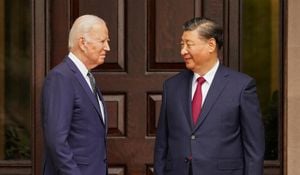With the dawn of new leadership under President Prabowo Subianto, who took office recently, the Indonesian government is revving up health initiatives aimed at addressing some pressing public health concerns. The Ministry of Health has swiftly articulated plans for innovative and inclusive health programs as part of what they are calling the "Quick Win" agenda, which aims to deliver tangible benefits to the population within the first 100 days of the new administration. This initiative is particularly focused on enhancing healthcare access and services, especially for women and vulnerable populations.
One of the standout components of this health initiative is the ambitious proposal to offer free breast cancer screenings to women on their birthdays, set to roll out beginning in 2025. This unique program was announced by Ida Budi Gunadi, advisor at the Ministry's Organization of the Civil Servants’ Wives. The objective is twofold: to improve awareness about the importance of early detection of breast cancer and to provide accessible screening services aimed at fighting the disease. According to statistics from the Indonesian Women’s Cancer Advocacy Association, late-stage diagnoses remain prevalent, with over 48% of breast cancer cases identified at Stage III or later, often resulting in higher mortality rates among patients.
Ida explained, “We aim to conduct these screenings based on age categories—youths, adults, and seniors starting from 18 years old. Alongside breast cancer screenings, the initiative will also target cases of cervical cancer, liver cancer, and hepatitis.” This health program reflects the government’s proactive stance toward addressing specific health issues faced by Indonesian women, aiming not just to treat but to prevent grave health outcomes resulting from late diagnoses.
The initiative is framed within three health programs led by the Red and White cabinet under the new presidency: controlling tuberculosis, building hospitals especially in remote areas, and offering free health check-ups. These measures highlight the government’s intention to create equitable health services throughout the archipelago.
Health Minister Budi Gunadi Sadikin, during his briefing, noted the importance of educational efforts to promote regular health screenings. He emphasized the dire need for public awareness campaigns to encourage individuals to take charge of their health proactively. The issues of early detection intertwine with the educational outreach, as many communities still possess limited knowledge about the benefits of regular health check-ups and preventative care options.
Prabowo’s vision for health doesn’t just stop with cancer screenings. Part of his broader health initiative includes increasing hospital infrastructure to serve those who might otherwise travel long distances for treatment. Such projects indicate the government’s dedication to building sustainable healthcare systems capable of addressing the unique needs across different regions of the country.
Alongside the expansion of preventative services, Prabowo's government is also pursuing strategies to combat the rising crisis of tuberculosis, hoping to control the disease more effectively through widespread screening and treatment availability. The backdrop to these initiatives is the alarming rates of non-communicable diseases (NCDs) such as diabetes and hypertension, which have seen distinctly rising trends among the population.
Reflecting on the broader health infrastructure, the government is prioritizing points of care such as Public Health Centers (Puskesmas), aiming to streamline services and improve healthcare delivery. The Ministry recognizes existing gaps and is actively updating guidelines for Puskesmas to meet the demographic changes across the nation, addressing both urban and rural healthcare disparities.
Recent statistics echoed by the Health Ministry have underlined the urgency of action: significant mortality rates from NCDs necessitate immediate reform of existing healthcare approaches. The new administration, through its focus on health services, intends to decrease these numbers through integrated work across various ministries.
Notably, the government is also building partnerships to boost clinical research, with recent announcements about the formation of the Indonesia National Health Research Center, which aims to bolster clinical trials and promote local health innovation. This initiative is not only timely but also strategic, laying the groundwork for advancements in Indonesian medicine and healthcare delivery.
Economic support directly influences health decisions too. The cabinet emphasizes job creation and economic stability as part of its broader agenda to forge healthier communities. Minister Pratikno’s recent discussions with the Ministry of Youth and Sports highlighted the connection between socioeconomic factors and overall community health outcomes, reinforcing the belief held by many officials: the healthier the populace, the stronger the nation.
Collectively, these programs under President Prabowo’s leadership are stepping stones toward establishing sustainable health norms across Indonesia. The focus on preventative health measures, education, and infrastructural advancements signal fundamental shifts, promising to make strides against some of the country’s most pressing health challenges. Ensuring widespread accessibility and improving awareness are not mere slogans but are set to be actionable by 2025, reflecting both hopes and responsibilities to the Indonesian people.
Looking forward, there lurks the challenge of implementation. Officials must navigate potential bureaucratic hurdles and societal misconceptions to garner maximum participation from the public. The success of these health initiatives will rely on not only government efforts but also on the engagement of community leaders and citizens alike. By inviting feedback and fostering collaboration with local health organizations, the government can truly tap the collective strength of Indonesian society as it pushes toward these ambitious health goals.
With time, the upcoming launch of various health-related programs under the new administration could transform the daily lives of millions across Indonesia. The integration of health, education, and economic drives brought forth by President Prabowo promises not just to highlight the nation’s challenges but to also assert their resolve to remedy them collectively with innovation and access.



